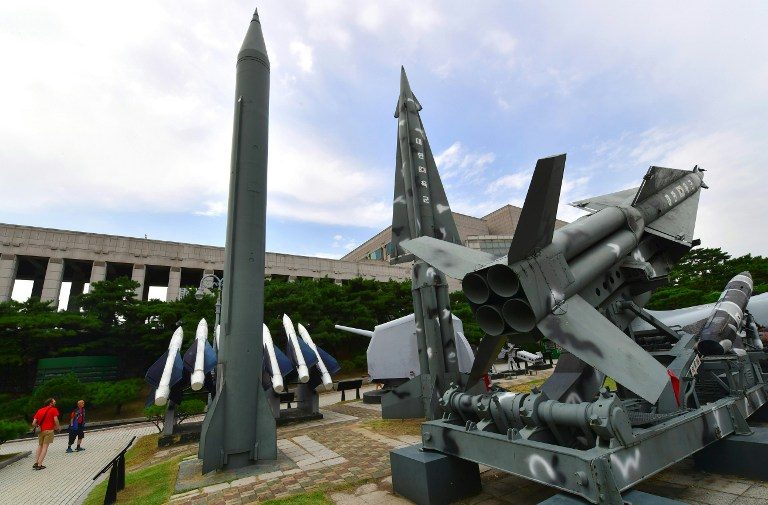SUMMARY
This is AI generated summarization, which may have errors. For context, always refer to the full article.

PYONGYANG, North Korea (5th UPDATE) – North Korea claimed Friday, September 9, it had successfully tested a nuclear warhead that could be mounted on a missile, drawing condemnation from the South over the “maniacal recklessness” of young ruler Kim Jong-Un.
The blast at the Punggye-ri nuclear site was the North’s fifth and most powerful yet at 10 kilotons experts said.
“If we put that into perspective, it is smaller than Hiroshima or Nagasaki, but would still be capable of ripping the heart out of a city,” said Karl Dewey, an analyst at IHS Janes.
Pyongyang’s state media said the test, which comes after a series of ballistic missile launches, had realised the country’s goal of being able to fit a miniaturised warhead on a rocket.
“Our nuclear scientists staged a nuclear explosion test on a newly developed nuclear warhead at the country’s northern nuclear test site,” a North Korean TV presenter said.
“Our… party sent a congratulatory message to our nuclear scientists… for conducting the successful nuclear warhead explosion test,” said Ri Chun-Hee, a veteran who has delivered all the North’s biggest announcements.
The news drew swift condemnation from US President Barack Obama who warned of “serious consequences” and said he had called the leaders of South Korea and Japan to confer over the crisis.
The South’s President Park Geun-Hye spoke out against the “maniacal recklessness” of Kim, who since taking control after the death of his father in 2011 has carried out a series of purges and weapons tests designed to show strength and consolidate power.
“Kim Jong-Un’s regime will only earn more sanctions and isolation… and such provocation will further accelerate its path to self-destruction,” Park said.
US Secretary of State John Kerry and his Russian counterpart Sergei Lavrov, meeting in Geneva, said they would refer the matter to the United Nations.
Search for clues
Friday’s test came as American and South Korean forces staged a re-enactment of the Incheon landing, 66 years after the start of Operation Chromite, the battle that turned the tide in the Korean War.
First indications of an underground explosion came when seismic monitors detected a 5.3-magnitude “artificial earthquake” near the Punggye-ri nuclear site.
“The 10-kiloton blast was nearly twice the (power of the) fourth nuclear test and slightly less than the Hiroshima bombing, which was measured about 15 kilotons,” said Kim Nam-Wook from the South’s meteorological agency.
But attention soon shifted from the power of the blast to Pyongyang’s claim that it was a miniaturised warhead.
If Pyongyang can make a nuclear device small enough to fit on a rocket – and bolster the range and accuracy of its missiles – it might achieve its oft-stated aim of hitting US targets. But its past claims to have achieved this have been discounted.
However, North Koreans who gathered around public screens to watch the official announcement of the test – which came on the 68th anniversary of the country’s founding – were approving.
“US bastards may be saying this and that, but we fear nothing as our military power has strengthened further,” said one woman, who did not give her name.
Ordinary North Koreans usually express only officially-sanctioned views when questioned by foreign news organisations.
Pyongyang routinely insists Washington is on the verge of launching all-out war against it.
Outside experts said authenticating North Korea’s claim to have mastered miniaturisation would be difficult using seismic data alone.
“We would need to see it tested on a missile, like China did in the 1960s,” said Melissa Hanham, a North Korea expert at the Middlebury Institute of International Studies.
“Nobody wants to see that. There is no way they could do that test in a safe way, and it could easily start a war.”
China under pressure
Japan condemned the test as “absolutely unacceptable” while the head of the UN atomic watchdog said it was a “clear violation” of numerous Security Council resolutions.
North Korea has been hit by five sets of United Nations sanctions since it first tested a nuclear device in 2006, but has insisted it will continue, come what may.
The nuclear program has gone alongside a series of ballistic missile launches, the latest of which took place on Monday even as world powers gathered for a G20 meeting in China.
This week’s events are yet another slap in the face for Pyongyang’s chief ally, China, which has been under pressure to rein in its increasingly embarrassing neighbour.
China said Friday it “firmly opposes” the test, but it has limited room to manoeuvre, given its priority is to avoid a collapse of the regime that would create a crisis on its border and shift the balance of power on the Korean peninsula towards the US.
The US-Korea Institute at Johns Hopkins University said the latest development made plain that the US and South Korean strategy on restraining North Korea “has clearly failed”.
“No one should be surprised that North Korea continues to conduct nuclear tests to enhance the capabilities of its growing arsenal. Nor should they expect China to solve this problem for the United States,” said the institute’s Joel Wit.
North Korea claimed its January test was of a more powerful hydrogen bomb, but scientists said the yield was far too low for a thermonuclear device. Initial indications from Friday’s blast pointed in the same direction.
“What we can tell from the seismic waves so far is that this is likely not a thermonuclear test,” said 38 North managing director Jenny Town.
“We are still in the preliminary stages but our analysts believe they tested a basic nuclear device not an advanced device,” she said. “If we were looking at a thermonuclear test, we would see very different seismic waves.” – Rappler.com
Add a comment
How does this make you feel?
There are no comments yet. Add your comment to start the conversation.